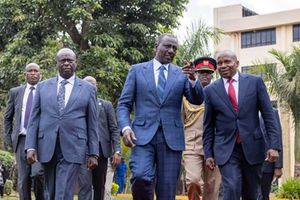Addis hosts forum on future of African cities

An Ethiopian Airlines plane on the tarmac at Bole International Airport in Addis Ababa.
What you need to know:
- This forum promises to foster transformative dialogue on urbanisation.
- We can create cities that are liveable, sustainable and environmentally resilient.
The upcoming Africa Urban Forum to be held from September 4 to 6 in Addis Ababa offers an unprecedented platform for stakeholders to strategise on Africa’s rapid urbanisation and urban development.
This forum promises to foster transformative dialogue on urbanisation, housing, climate change and resilience, guided by the African Union’s Agenda 2063, which envisions a prosperous and interconnected Africa.
With urban populations expected to double by 2050 to reach1.3 billion, African cities are emerging as economic and innovation hubs, highlighting the need for strategic planning.
Urbanisation in Africa presents both challenges and opportunities. Issues like infrastructure deficits, housing shortages, and environmental sustainability require innovative solutions.
More than 70 per cent of cities in African are now facing the challenge of climate change and are hard-hit by natural disasters. This has also led to increased slum populations, poverty, and inequality.
Informal employment dominates, with 85.8 per cent of all jobs being informal. Weak institutions and poor urban planning have resulted in dysfunctional housing and land markets, causing the growth of informal settlements and environmental degradation.
The current state of many African cities underscores the urgent need for stronger institutions, comprehensive housing policies, and effective urban planning. Without robust governance frameworks and clear policy direction, urban areas have been haphazardly developed, leaving millions of residents to live in overcrowded, substandard housing without access to basic services. This chaotic urban sprawl not only deepens social inequalities but also places immense strain on natural resources, exacerbating environmental challenges.
Economic transformation
As we gather at the Africa Urban Forum, it is crucial to address these foundational issues and advocate for a coordinated approach to urban development that prioritises the establishment of sound institutions, inclusive housing strategies and sustainable urban planning. By doing so, we can create cities that are not only liveable, but also sustainable and environmentally resilient.
Urbanisation offers opportunities for economic transformation, social equality and environmental sustainability. Cites in Africa require a lot of investments to fill the housing deficit, and provide equitable access to basic services and infrastructure. To decrease the carbon footprint, we need to invest more on green infrastructure and clean energy in cities.
Yet the financial flow in cities has not yet met the required investment, with local and sub-national governments having limited financial means to meet demand. By investing in infrastructure and managing urban growth, governments can enhance job opportunities and quality of life (industrial parks zoning, service delivery, financing innovation).
Properly managed urbanisation can also benefit the environment through improved productivity and green technologies towards achieving the net zero carbon in Africa.
UN Habitat’s focus on Africa is more critical than ever. By working closely with African governments and local authorities, it seeks to improve urban planning, develop effective housing policies, and strengthen institutional capacities. Its approach is rooted in the belief that sustainable urban development is not just about building infrastructure, but also about fostering social equity and environmental sustainability.
Through technical assistance, policy advocacy, and partnership-building, UN Habitat supports initiatives that aim to reduce slum proliferation, enhance infrastructure and promote urban resilience.
Rapid urbanisation
As the Africa Urban Forum convenes, the presence and guidance of UN Habitat will be indispensable in steering the dialogue towards practical solutions that align with the Sustainable Development Goals and the African Union’s Agenda 2063.
By leveraging the agency’s expertise and fostering collaboration among stakeholders, we can ensure that Africa’s urban future is one that benefits all its inhabitants and the environment.
Established by the African Union’s Specialized Technical Committee on Public Service, Local Governments, Urban Development, and Decentralization, the Africa Urban Forum aims to facilitate high-level discussions on urban development challenges with the aim of developing a consensual road map among representatives of member states to harness the potential of urbanisation for an economic and environmental transformation of the continent in the context of the Africa Continental Free Trade Agreement.
Supported by UN Habitat and UNECA, the forum will bring together and promote collaboration among all relevant stakeholders, including government representatives, local governments, academia, built environment professionals, financial institutions, development partners, civil society and private sector. Shared best practices and engagements could catalyse actionable policies that prioritise human development and environmental management.
Recognising the diversity of urban experiences across Africa, the forum aims to emphasise local knowledge and community engagement. By adopting context-specific approaches and inclusive governance, African cities can foster a sense of ownership and resilience among inhabitants.
As the Africa Urban Forum approaches, the challenges and opportunities of rapid urbanisation in Africa are increasingly becoming clearer.
With strategic planning, collaboration and a commitment to sustainable development, African cities can become engines of growth and prosperity. The forum in Addis Ababa will be a crucial step towards realising this vision, bringing together leaders to shape the continent’s urban future.
Mr Sylla is the Director Regional Office for Africa, UN-Habitat





